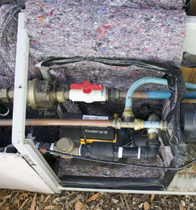Pumps

Do you need a pump?
A pressure pump will make it easier to use collected rainwater. Without a pump you may be able to water parts of your garden but you won't be able to use rainwater inside the house. Pumps allow you to use rainwater in the same way you use mains water. In choosing a pump you need to consider the number of taps that are likely to be used at once, the height and distance you need to pump water, the noise of the pump and the price. Ask your plumber or pump manufacturer for help with this.
Energy usage of pumps
Pressure pumps for household water supply use relatively little energy and it can be reduced through clever design. Pumps draw power every time you turn on a tap. The energy consumption of pumps increases as the pumps get more powerful. For example, pumps rated at about 35L a minute use about 600 watts when they are pumping, while pumps rated at 45L a minute can consume about 800 watts.
Recommendations to reduce energy consumption of tanks
Don’t use pumps that are too big for the job required. Choose lower wattage pumps capable of performing the task you need. Use GreenPower for all your electricity, including the pumps. In places with access to the electricity grid, the best way to "solar power pumps" is to "solar power a house". Grid-connected solar electricity systems make this easy. There are no batteries and they are designed to be maintenance free.
Depending on the set-up of your system you may need a large pump to ensure good pressure and flow throughout the house. It is possible, however, to minimize the energy required from these pumps through the use of a header tank. The rationale for this is that most pumps operate for a set period of time when triggered even if a tap is only turned on for a second. This is where energy wastage can occur. By installing a small header tank of about 200 litres next to the house and pumping water to this header tank from the main tank, you will only require the pump to be in use when the header tank needs filling. This is one way to reduce your energy usage.
If this is not practical or does not provide you with enough or constant pressure, you can connect a pressure tank to your pump system. Pressure tanks store water under pressure, which is released when a tap is turned on. The pump only takes over when the bladder inside the pressure tank empties and will then pump water directly to your house. The advantage of a pressure tank is that the pump is not turned on for those small intermittent uses such as when a toilet is flushed. The amount of water stored depends on the size of the pressure pump. A typical household pressure pump would usually be about 30 to 60L, giving a draw off (i.e. before the pump takes over) of between 12 to 24L.
Also be aware that devices which automatically switch from rainwater to mains water when the rainwater runs out use energy for the work they are required to do. If possible, consider installing a manual rainwater-to-mains switch for your system, and a level gauge so you know when to switch between mains and tank water.
Noise of pumps
Noise on domestic pumps is governed by EPA guidelines that set out time blocks and maximum noise levels at the closest point to your neighbour’s house. A pump’s noise is dependent on its type. Incorrect installation can also cause noisy operation; large pipework will reduce the chance of this happening. A pump can be enclosed to keep noise down, but make sure the enclosure is large enough to avoid the pump overheating.
- Peripheral turbine
- Jet pump
- Multi-stage pump
- Submersible pump
Would like a quieter pump or have our current pump in another location out of hearing or fitted with a sound-proof pump cover.
A small gravity feed tank has recently been added. This is a huge improvement as we only require power to fill this tank about once every 10 days. Water to house is now available even in blackouts. My advice to new builders, plan tank locations and capacity before starting to build and try and rely on gravity feed. Also, plan for solar heaters in advance.
I would love a solar pump to use instead of 240V system… but can't afford it.